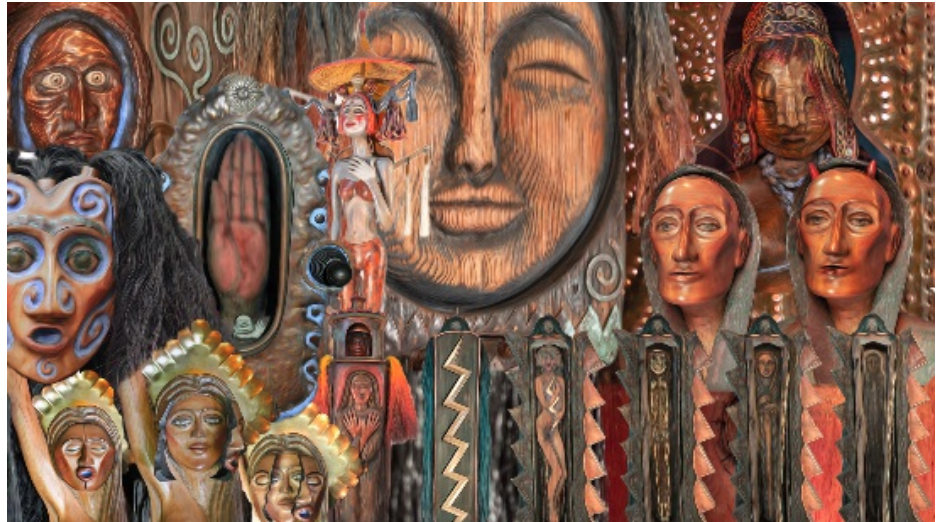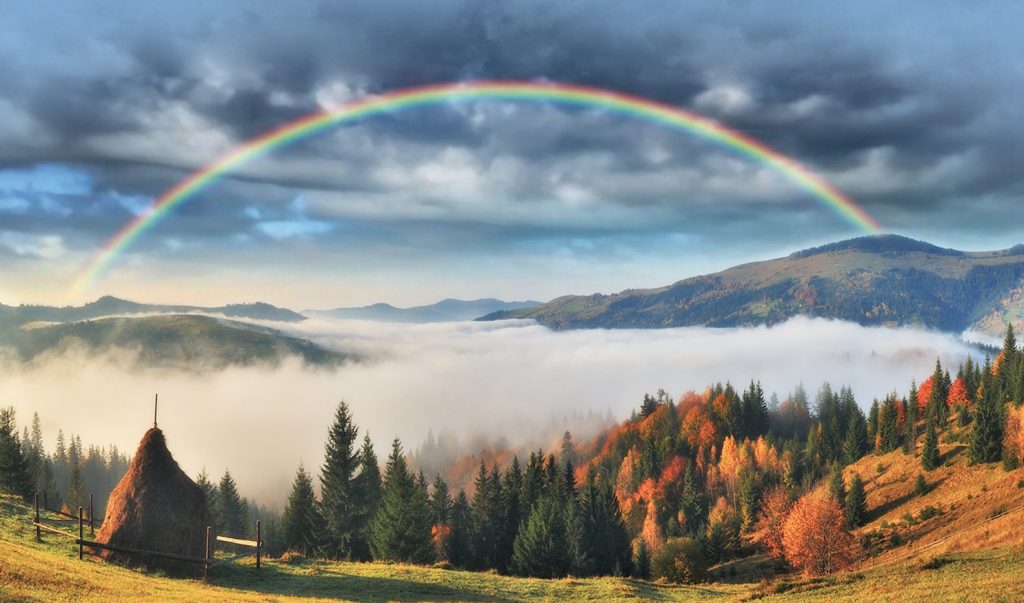The Problem with “More”
Our globalized world lures us to crave more. The culture of “more” is a culture of not enough, accumulation and conquest, and sought but constantly deferred satiety. Every time we text message or update Instagram, researchers tell us that our brains loop in a dopamine cycle of neurological yearning.
We seem unable to discern when enough really is enough—and especially so in the Global North. From shopping to Netflix binge-watching, sexual hook-up culture to alcoholism, to the reckless gambling of Wall Street speculators, we are in thrall to both trivial and life-threatening addictions. Intervention in desire’s consumptive assault is written off as bad economics or puritanical repression.
The very fear of limiting desire reveals how out of control desire is, and how, in fact, our excess longing imperils the planet. For example, the Intergovernmental Panel on Climate Change has stated consistently for nearly three decades that human activities increase greenhouse gas emissions. Our crisis moment, however, finds Americans regressively debating whether climate change is a hoax while oil companies scour and drill Earth for more “exploration and production.”
I am, of course, personally implicated in “more,” a disease that Clive Hamilton and Richard Denniss memorably called Affluenza in their book of the same name: When Too Much is Never Enough. I live in the United States, the great purveyor of the myth of more. My family and I are tucked away in a beautiful rural corner of Massachusetts, but even in the country I nevertheless internalize lies. These lies I tell myself, inculcated in the culture of more, range from the substantial to the mundane: If I work harder as a church pastor, my church will be more successful and more people will come. If more people like me, I’ll be content. If I purchase more books, I’ll acquire more knowledge and maybe even wisdom. If I drink another beer, I’ll feel more relaxed.
The desire for more, though, is ultimately a crisis of desire. What is it that we desire when we desire more? It’s usually not the thing itself. The thing itself, whether a lover, job position, third-quarter earnings goal, or new style of jeans, remarkably fades away in desire’s fickle dissatisfaction. But seekers on transformation’s path have known for millennia that desire’s incompletion points inexorably to spirituality. As writer Ronald Rolheiser puts it, “There is within us a fundamental dis-ease, an unquenchable fire that renders us incapable, in this life, of ever coming to full peace…Spirituality is ultimately what we do with that desire.”
The Spanish Carmelite mystic John of the Cross is a spiritual director for our obsessive age of “more.” He is justly famous for his concept of the “dark night of the soul”—those periods of faith in which our certainties, hopes for the future, beliefs about God, and even faith itself are eclipsed. But he also wrote about another dark, albeit less popular, night: the dark night of sense.
The dark night of sense precedes the dark night of the soul in that it harnesses our desire and prepares our will to be ready to receive, meet, and fall in love with God. There is no union with God, John says, without first curbing our appetites. No love without first setting limits. John poetically affirms that the goal of the spiritual life is love-drenched union with God, but today he might clarify that union doesn’t happen first in yoga class, on a beach at sunset, or hands raised in a particularly affecting religious service. According to John of the Cross, union is instead (and unfortunately) the fruit of long, dark nights. Union is a gift after the excruciating process of detaching our desires from all that is not God.
John’s book, The Ascent to Mount Carmel, does not fly off many bookstore shelves. And I get it. The book maintains a rigorous methodological style and insists on the torture-sounding process called mortification. This word “mortification” is one of those crusty, cringe-inducing words from mystical tradition that contains spiritual power but is widely misunderstood. And, since the word is widely misunderstood, it is hardly used at all. Mortification, in theory, might sound like punishment in an imperialist black site prison, but mortification in practice looks surprisingly like liberation.
Mortification is not—much as the word’s sound might suggest—medieval or modern self-flagellation. But it is connected, etymologically, and spiritually to death. John writes, “The mortification of the appetites can be called a night for the soul. [Because] to deprive oneself of the gratification of the appetites in all things is like living in darkness.” John is describing the often-painful process of letting go of the ultimacy that our appetites ascribe to non-ultimate people, places, emotions, substances, and things. Spiritual transformation leads through darkness because the process of limiting desires feels like death. Just ask any serious caffeine addict who tried to give up coffee. Or, better yet, talk to a person in recovery.
Anyone who is paying attention to global crises, however, knows that in fact, the opposite is true. It’s not limited (mortified) but unchecked desire that leads to death. Death is on prime-time display in the form of irreversible climate change, deforestation, vast inequality between rich and poor, Global North obesity vis-à-vis Global South food insecurity, devaluing and over-sexualization of women’s bodies, piling up trash in landfills and oceans, species extinction, and more.
There must be a point at which we say, “Enough.”
To suggest that appetites are somehow at the root of our problems and must be restrained is not a popular message and is easily misunderstood. To stereotype to make a point: liberals fear limiting desire because their sense of freedom is tied up in individual autonomy; conservatives more easily set boundaries around desire but usually at the cost of valuing bodies, sexuality, and desire.
According to John of the Cross, however, bodies and desires are not the primary cause of suffering. It is critically important to say—in the context of a Christianity that has ignored, demeaned, and often abused bodies—that bodies are beautiful, sexuality is wonderful, and desire itself is holy!
Rather, our wills are the problem. Here’s how John puts it: “The less strongly the will is fixed on God, and the more dependent it is on creatures, the more…the passions [inordinate desires] combat the soul and reign in it.” Our wills attach to the objects of our appetites, and we invest them with meaning and purpose rather than God. This is a basic enough movement of the heart, but it leads to spiritual disaster.
To give a trite example: I’m a compulsive email-checker. I intend, without success, to create boundaries around my phone. On any given day and in spite of spiritual practice, my center of emotional gravity is inevitably thrown off. I realize—usually after the fact—that my phone has become an extension of my hand and consciousness.
For what am I hoping? Sometimes it’s for someone to write me back and sometimes it is an ambiguous, object-less sense of unease. I don’t know what I’m hoping for in that moment, but I pull out my phone to provide a fleeting respite of relief from vague, ill-defined discomfort.
Mystics and theologians from Augustine to John of the Cross call this dissatisfaction “inordinate desire.” This is the type of yearning within us that aches for union with the infinite but settles instead for the finite and thus perpetually lets us down. Sometimes it’s as simple as the vague anxiety after checking email. Sometimes it’s bland ennui or soul-numbing depression. Sometimes, more catastrophically, our collective desires crash via social systems such as the unjust excesses of corporate capitalism. When the desires of whole cultures and people groups run amok, as many have, it instigates widespread crisis.
In the letter to the Ephesians, located in the New Testament, the author attunes acutely to the struggle of desire. One Greek word he uses captures desire’s storms. The word is epithumia and is translated as lust or passion (2:3). It is what Gordon Gecko embodies in the movie Wall Street in which he quips, “Greed is good.” Or, more profoundly, it is what Augustine of Hippo has in mind when he writes, “That reign of desires savagely tyrannizes and batters a person’s whole life and mind with storms raging in all directions.” Epithumia today stirs up such storms, both personally and politically. It leads to personal unhappiness and broken relationships, but it is also the unaccountable desire to reap profit at the expense of the poor and the planet.
To heal unaccountable desire, though, requires contemplative soul work. We find healing not in libertinism or repression but in locating human desire within a larger economy of divine desire. Much of the work of Anglican theologian Sarah Coakley locates itself at this very intersection of contemplation and desire. Commenting on sexuality and gender battles in the church, she writes, “The current crisis is about the failure, in this Web-induced culture of instantly commodified desire, to submit all of our desires to the test of divine longing.”
The biblical writers have always said the same: “We love because God first loved us” (1 John 4:19). Ephesians chapter two does not end with Gordon Gecko or the Mall of America but in God’s love for us: “God, who is rich in mercy, out of the great love with which he loved us…made us alive together with Christ-by grace you have been saved” (2:4-5).
All these examples point to desire of a different order: it’s not excessive desire that leads to death; it’s divine desire that leads to love. There is Presence within the universe, a Christian faith affirms, that moves towards us with love. This presence of love is fierce, however, because for those who are willing, it contains the transformational capacity to disrupt and realign our desires. The process is mortifying, a true dark night of sense, but worth the wait. Rightly ordered desire frees us to live lives that embody the wholeness for which our world groans, lives centered on mercy, peace, and compassion rather than destructive, epithumia-emboldened consumption.
This is why a renewed asceticism is needed so desperately today. We surely don’t need asceticism that scorns the body or shames sexual desire. Christianity has left far too many wounded casualties in its path. Rather, we need an asceticism that affirms bodies and selves, but nevertheless purifies the will so that our desires align with God’s desires. We’ll never be satisfied with gadgets, accolades, and more stuff, but the alignment of human desire with divine desire is the goal of our longing. As one of my teachers, James Finley, says, “We are made in such a way that nothing less than an infinite union with Infinite Love will do.”
Infinite Love is the intervention to the greed-fueled, desire-addled world in which we find ourselves. Wholeness and union follow the dark night.







The unity with the divine is a wonderful way to express love. I am impressed by Mr. Longhurst’s willingness to put aside what I have believed to be the long held disgust the Christian church has seemed to express regarding sexuality. The understanding of the problem of always wanting more is well thought out. Spirituality seems to be the answer. I have been to Nepal and spent some time at temples. I have met mystics that lived in caves at these temples that only had what was given them by people coming to the temples. They were very thin and their clothes were shabby, but they had a look of divine peace on their faces.